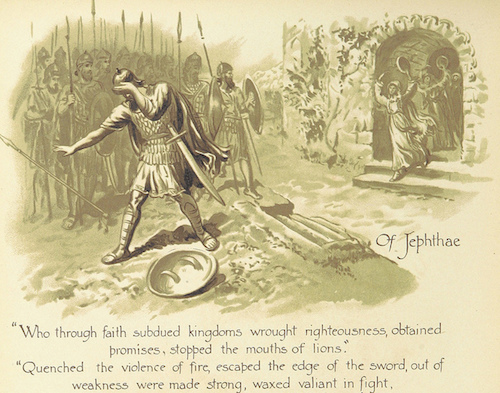We run our website the way we wished the whole internet worked: we provide high quality original content with no ads. We are funded solely by your direct support. Please consider supporting this project.

Does Hebrews 11 Praise Violence? A Response to Paul Copan (#2)
Once or twice a week, as time allows, I will be responding to criticisms of Crucifixion of the Warrior God (CWG) that were raised by Paul Copan in a recent paper that he delivered at the Evangelical Theological Society. In my first post in this series I responded to Copan’s claim that Paul’s quotation from Psalm 69, which is a vindictive imprecatory prayer, refutes my claim that this Psalm contradicts Jesus’ revelation of God and kingdom ethics (CWG, 328). In this post I’d like to respond to Copan’s argument that Hebrews 11:32-34 refutes my claim, made through CWG, that the crucified Christ reveals a God who is inherently non-violent and who calls on his people to abstain from violence.
But before I turn to this passage, I’d like to make an important preliminary observation. Much of Copan’s paper is spent trying to demonstrate that neither Jesus nor the authors of the OT were completely opposed to violence (or, as Copan prefers, “the use of coercive force”). In fact, at no point in this paper does he explicitly argue against the Cruciform Thesis, which is my proposed way of disclosing how violent divine portraits point to the revelation of God in the crucified Christ.
If Copan’s goal was to refute this thesis – which is, after all, what CWG and Cross Vision are all about – I’m not sure going after my pacifistic understanding of the NT was the best strategy for doing this. For there is no reason why someone couldn’t agree with Copan that Jesus and the NT allow for the justified use of violence, on the one hand, and yet embrace the Cruciform Thesis, on the other. After all, the task of disclosing how (say) the biblical portraits of God commanding his people to engage in merciless genocide bear witness to the cross remains, regardless of what one thinks the NT’s stance is on justified violence. So even if I were to grant, for the sake of argument, Copan’s interpretation of the NT passages he cites against my thesis, he would not have done much to refute my thesis.
And on that note, I, for one, would be interested in learning what Copan proposes as an alternative to my thesis. How does Copan think the genocidal portraits of God in the OT bear witness to the cross? On the other hand, if Copan doesn’t agree that all Scripture is supposed to bear witness to the cross, I would have thought he would have spent the bulk of his paper critiquing the 180 pages I spent in CWG making the case that it is supposed to all point to the cross. About this, however, he said nothing.
This preliminary point being made, I turn to Copan’s claim that the author of Hebrews condones violence. In the process of extolling the power of faith, the author of Hebrews writes:
And what more should I say? For time would fail me to tell of Gideon, Barak, Samson, Jephthah, of David and Samuel and the prophets— who through faith conquered kingdoms, administered justice, obtained promises, shut the mouths of lions, quenched raging fire, escaped the edge of the sword, won strength out of weakness, became mighty in war, put foreign armies to flight (Heb 11:32-34).
The challenge Copan presents me with is this: how could this author praise people whose “faith conquered kingdoms” and made them “mighty in war” and able to “put foreign armies to flight” if the author believed that God was altogether opposed to violence and wanted his people to abstain from violence?
In response, I’d first say that, if I felt I had to, I could simply concede Copan’s point that this author apparently assumed that God was not altogether opposed to violence. After all, there is no reason to assume that every NT author grasped with equal clarity and equal speed all the implications of the revelation of God in Christ. Indeed, I think it’s obvious that they did not.
For example, Peter seems to have been much slower than Paul on grasping the truth that in Christ all ethnic, gender and class distinctions and rankings have been rendered null and void (Gal 3:28-29; Eph 2:14-16). Indeed, Paul had to rebuke Peter for his unwillingness to let go of the Jewish-Gentile divide when he was around fellow Jews (Gal 2:11-14). And whereas Paul understood that in Christ, husband and wives should “be subject to one another” (Eph 5:21), Peter yet insists that wives should unilaterally submit to their husbands and call them “lord,” just as he says slaves should do to their masters (2:18-3:6).
In my view, all such passages in the NT should be interpreted the same way I recommend interpreting all passages in the OT that are sub-Christlike in character: they bear witness to a God who would rather stoop to embrace people in their fallen and culturally conditioned state then coerce them into having true conceptions of him and true understandings of his will. If I had to, I would interpret Hebrews 11 along these lines.
But I don’t believe this is the only, or even the best, way available to me to counter Copan’s argument. For the sheer fact that this author praises the faith of an OT hero does not imply that he/she endorses every aspect of this hero’s life or the way this hero lived out their faith.
This author praises the faith of Rahab without mentioning her being a prostitute. But I seriously doubt this suggests that this author condoned her profession.
This author praises the faith of Gideon, but must we on this basis conclude that he/she condoned all of Gideon’s grotesquely violent exploits, including skinning alive all the elders of Succoth with thorns and briers just because they had taunted him (Judg 8:18)?
This author praises the faith of Samson, but would anyone want to conclude from this that he/she condoned Samson’s fondness for prostitutes or his murdering 30 random civilians just so he could get their cloths and pay off a debt he foolishly incurred (Judg 3:19)?
And this author praises the faith Jephthah, even though Jephthah expressed this faith by sacrificing his only daughter as “a burnt offering” to the Lord in exchange for a military victory (Judges 8:29-40).
The point is, it is possible to extoll the power of a person’s faith as well as other virtuous aspects of their character without thereby condoning all the ways they express their faith and character. Indeed, in CWG (1087-1093) I argue that we should not let the fact that ancient Israelites were not yet able to receive the revelation that their true enemies were not “flesh and blood” (Eph 6:12) undermine our admiration for the courage and dedication to Yahweh that they sometimes display in their (misguided) warfare against other humans.
By the same token, the author of Hebrews is praising the power of faith that allowed some to “conquer kingdoms” and “put armies to flight,” but this doesn’t mean he assumed that their military exploits were godly. And for this reason, I don’t believe Hebrews 11: 32-34 serves as a compelling reason to think the authors of the NT condoned violence. Still less does it constitute a compelling objection to the Cruciform Thesis.
Photo by The British Library on VisualHunt.com / No known copyright restrictions
Category: General
Tags: Crucifixion of the Warrior God, Non-Violence, Paul Copan
Topics: Interpreting Violent Pictures and Troubling Behaviors
Related Reading

Will Violence against ISIS Root Out Evil?
Image by arbyreed via Flickr Fallen humans tend to identify their own group as righteous and any group that opposes them as evil. If they were not evil, we tend to believe, no conflict would exist. Hence, the only way to end the conflict is to rid the world of this evil. This is the age-old “myth…

Eye for Eye: That Time Jesus Refuted An Old Testament Teaching
One of the most surprising aspects of Jesus’ teaching is that, while he clearly shared his contemporaries’ view of the Old Testament as inspired by God, he was nevertheless not afraid of repudiating it when he felt led by his Father to do so (Jn. 8:28; 12:49-50; 14:31). For example, while the OT commands people…

A Guide to the Book of Revelation
Marc Nozell via Compfight Kurt Willems posted this excellent guide for reading the Book of Revelation as it was intended to be read. As Kurt points out, this is the most misunderstood and misinterpreted book of the Bible. If you were weaned on A Thief in the Night or the Left Behind series of books,…

Does Paul Condone Vindictive Psalms? A Response to Paul Copan (#1)
In a recent paper delivered at the Evangelical Theological Society, Paul Copan raised a number of objections against my book, Crucifixion of the Warrior of God. This is the first of several blogs in which I will respond to this paper. (By the way, Paul and I had a friendly two-session debate on Justin Brierley’s…

Should Christians Arm Themselves?
Jerry Falwell Jr, the president of Liberty University, recently encouraged the students to arm themselves saying, “I always thought that if more good people had concealed-carry permits, then we could end those Muslims before they walk in and kill.” In the light of Christ’s teaching, what should be our response? First, the NT is quite…

To What Extent is the Old Testament a Sufficient Revelation of God? (podcast)
Greg considers the relationship between the testaments. Episode 548 http://traffic.libsyn.com/askgregboyd/Episode_0548.mp3
